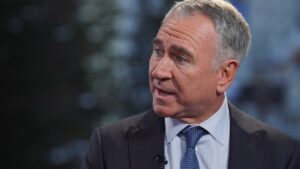This article is reprinted by permission from NerdWallet.
As a boy, Travis Tracy watched his mom struggle with credit card debt. Consequently, he avoided credit cards until age 23. John Bovard, Ron Strobel, and Marcus Blanchard grew up hearing horror stories about credit card debt and so they steered clear as young adults. Marguerita Cheng says she was initially afraid of credit since her father warned her early on about the risks of interest and fees. And Justin Green wasn’t taught much of anything about credit cards, so he didn’t use one until he was 22.
And yet, Tracy, Bovard, Strobel, Blanchard, Cheng and Green each grew up to be certified financial planners who now use credit cards regularly to their advantage.
Here is what these pros wish they had known earlier:
Credit cards aren’t inherently bad
Tracy, a CFP in Durham, North Carolina, and founder of Fortitude Financial Planning, grew up as the oldest child in a single-parent household. “My mom always got in trouble with credit card debt, so in my mind, it seemed like a bad idea,” he says. That’s why he waited until he was 23 before he got his first credit card, which he only applied for because he was moving and needed to finance some purchases.
He carefully paid off his debt, and as his comfort level with credit cards increased, he started using rewards cards to earn cash back. Now, at age 31, he earns cash back on his everyday purchases and makes sure to pay off the balance each month to avoid interest. “My biggest lesson was how important credit cards are to your overall financial purchasing power,” he says.
They can help you build your credit
“I was always hesitant; there were stories about people trying to sign you up for credit cards, and I was told, ‘Don’t do it,’” recalls Bovard, now a CFP in Cincinnati and owner of Incline Wealth Advisors. “In Cincinnati, cash is king, and credit cards are bad. My parents emphasized that message, too.” He also remembers being told that credit cards could lead to a lot of debt.
As a result, Bovard stuck with debit cards until his early 20s. That’s when he realized that if he wanted to get approved for a mortgage at some point, he would need to build his credit history. “I was nervous about it, especially around the fear of forgetting to make a payment,” he says. He avoided that risk by checking his balance frequently and eventually setting up automatic payments.
Now 32, he says he wishes he had opened a credit card sooner, as soon as he started earning income, so he could have started building his credit earlier. “That could have led to a better credit history,” he says, which he now knows can translate to lower mortgage rates when you apply for a loan.
Credit cards offer fraud protection
After college, Ron Strobel, CFP and founder of Retire Sensibly in Nampa, Idaho, opted to use a debit card instead of credit card because he grew up hearing credit cards could lead to debt. Then, when he was 22, his debit card was compromised with fraudulent charges, and the $900 in his checking account instantly disappeared. It took months to get the money back. After that, Strobel switched to using credit cards for the additional fraud protection.
“You should use a credit card for the fraud protection aspect. Every time you buy something, it feels different to swipe that credit card instead of a debit card, because you know you’re protected,” says Strobel, now 32.
They can help you in an emergency
When Cheng, a CFP based in Gaithersburg, Maryland, studied abroad in Japan in her early 20s, her host family’s smoking and cats aggravated her asthma. She had to quickly find new housing and buy a futon. That $300 purchase was made possible by her credit card.
“It would have been hard for me to get out of that home without the credit card. It taught me that having credit was important for emergencies,” she says. Her dad, who came to the U.S. in the 1960s with $17, had taught her that credit was powerful but also risky. “He would always say, ‘Don’t spend money in the dark,’ meaning fees and fines — that’s just wasting money,” she recalls.
“My dad did teach me well,” she adds. “I didn’t abuse credit. I used it wisely.” And her father was so proud of her (and concerned about her health) that he ended up paying her credit card bill for her.
You can keep your credit limit low
Blanchard, CFP and founder of Focal Point Financial Planning in Pleasant Grove, Utah, says he took out his first credit card at age 19 while serving in the Marine Corps, but then quickly closed it after hearing horror stories about credit card debt. “I didn’t really understand how it worked, how you build credit, or anything,” he recalls.
After he had a similar experience to Strobel in which his debit card information was stolen and his bank account was drained, he finally took out his next credit card. Now in his mid-20s, he was no less nervous about overspending and building up debt. “I didn’t really understand that if you pay it off, the interest rate doesn’t matter,” says Blanchard, now 30.
He says he wishes he knew that if you’re worried about overspending, you can keep your credit limit low on the card, which will cap the amount you are able to spend.
While that’s true, there is a major downside to this approach: A lower credit limit means you have less available credit. This can lead to a higher credit utilization ratio, which is the portion of your credit that you’re using, and can hurt your credit score. (Using much more than 30% of your overall available credit can have a major negative impact.) That said, once credit bureaus report that you have paid the balance down or off, the damage should disappear.
“I look back and think, ‘Dang it, I would have been better if I’d kept that first card open. My credit score would have gone from good to great,” he says.
Read: High schools are finally teaching kids what they need to know about finances
‘Never spend what you don’t have’
“I grew up in a lower-income family, so credit wasn’t something that crossed my mind until I learned I had unpaid medical debt,” says Justin Green, CFP and founder of Assist FP, a virtual financial planning firm based in the Boston area. Then, around age 22, he took out a credit card with a relatively low credit limit of $300 and paid it off each month so he could slowly rebuild his credit.
“The main thing to consider with a credit card is that you should never spend what you don’t have in cash on the card, because it can easily rack up and get you in trouble,” Green says. “Even as someone who is personal-finance oriented, I can see how it’s very easy to spend more using a credit card, and you do have to be careful,” he adds.
Learn more: 5 credit mistakes that can come back to bite you
Now, at age 29, Green uses multiple cards, which he pays off each month, and maximizes his travel rewards. He and his fiancé are planning to use those accumulated points to pay for their upcoming honeymoon, which will be to a yet-undetermined location. The only requirement? “Blue water,” he says.
More From NerdWallet
Kimberly Palmer writes for NerdWallet. Email: kpalmer@nerdwallet.com. Twitter: @kimberlypalmer.
This post was originally published on Market Watch






